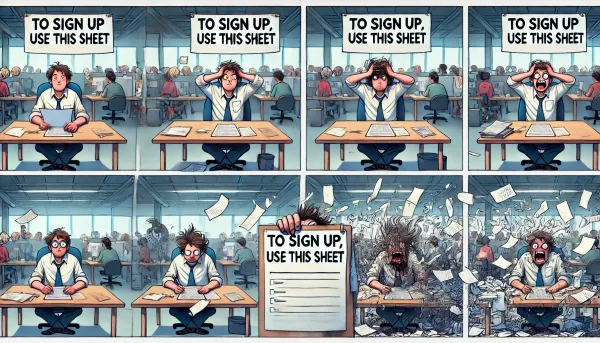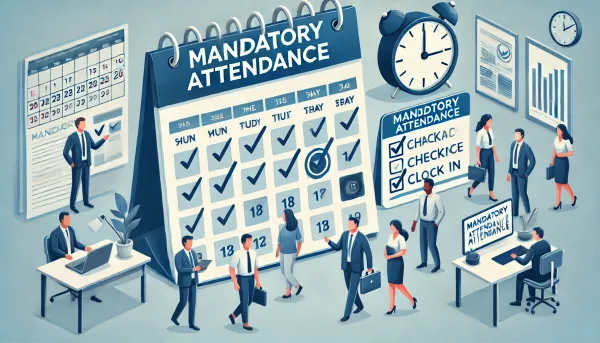Your Essence
In a previous post I wrote about the "No More Feedback" book. I'm not done with this topic yet. In fact, I skipped a concept Carol Sanford focuses on quite a bit in the book: your essence. I realize how hippie this may sound, but as usual: bear with me.
So, dear reader, let's continue our journey to make sense of a world without feedback, a world where everything you assumed to be "right" is turned up-side-down.
One of the great things about people, compared to machines, is that no two people are the same. Nevertheless, many of our practices in life, school and work, either explicitly, or accidentally push towards standardization: fitting a pre-defined mold. Standardized tests in school check if you hit a certain minimum sets of skills and knowledge. Competency matrices used in some companies measure you against expectations for predefined roles and ranks. While nobody will explicitly tell you to be like everybody else, such lists of expectations do show what we value: it's feedback. If you'd like to be a senior engineer, not only do you have to be very strong in writing code, understanding code, testing, architecture, you also need to be fully rounded individual with excellent social skills, influencing skills, display ownership, and be nice as a person, and also: give talks at conferences and write blog posts. If you excel in just a few of this areas, or better yet: areas not on the list — well whatever, you can do those other things too, but they may not help you. Work on those other things on the list to progress your career. Yes yes, I know it's painful, and perhaps it doesn't feel right, but... suck it up. That's life.
As usual, I'm exaggerating slightly to make a point. Nevertheless, often, systems are optimized to value certain pre-defined, known and general personal traits and skills. Those are the things used to determine salary raises and promotions. You can add more value to the company if you like, but in the ultimate execution of such career path systems, you'll only be incentivized for what's on the job description and competency matrix like everybody else. It's only fair.
Sanford suggests a radically different model: ditch predefined roles, seniority levels, job descriptions, competency matrices. Instead, clarify the company and each individual's essence, and figure out how to optimally align the two.
What is a person's "essence"? It's the thing that what makes you unique, different than everybody else. A company's essence is what makes the company unique: its vision, the impact it hopes to have on the world, as well as its strategy on getting there.
When somebody interviews for a job, rather than check-listing a skillset, you're looking for a "meeting of the essences." Is the candidate interested in contributing to the company's mission? Is there obvious value in the candidate's essence to achieve it? If so: go.
I know — this sounds overly idealistic and perhaps out of touch with reality. But doesn't it sound right as well? Skills can be learned, missing experience gained, but matching a company's mission and an employee's potential in helping achieve it — much harder.
As I reflect on my own career thus far I realize that only once or twice I've had jobs that were easily slotted into a well-defined career path. The first was my job as a PhD candidate (yes, in The Netherlands that's actually considered a job, it's paid and everything, at least in software engineering). Success criteria: publish X articles on ambitious conferences and perhaps a journal or two. Career path: 4 years of PhD, then a post-doc or two, associate professorship, then: full professor. I struggled a bit during my PhD. I cared more about building practical stuff that people could actually use than writing scholarly articles about it. It wasn't all that vital to me if an idea was provably novel (a large part of an academic article is about proving that what you did is different than everybody else), but more the value it provided — even if it was just a mix of existing ideas. Therefore, I did enjoy writing, but more to an audience of potential users, not academics that sometimes seemed more interested in ensuring you don't step into their space than actually new ideas. Nevertheless, I finished my PhD, I met the criteria, and then moved on. I wrote a bit about this frustration in 2011 in "Changing the World, One Paper at a Time”.
Then, I joined a start-up. Cloud9 IDE hired me as a "senior developer," but specifically they hired me because they needed somebody who understood parsers, compilers and such. Knowledge not unique to me, but somewhat rare. There was a good match between my interest in using academic ideas (parsing, static code analysis and tooling) and the company's mission to build a kick-ass IDE that was practically usable by users. In other words: it was a good match between essences.
If you'd ask any of my current or former bosses what made them want to hire me, likely few of them will enthusiastically hold up and point to a job description or competency matrix. Most of my roles were rather unspecified. Perhaps part of my "essence" is to thrive in ambiguous situations, and somehow figure out what is needed, rather than relying on predefined job descriptions. "Our company is currently not perfect, you seem like a person that can make a difference. Do your thing."
So, what do we do with all of this? Do we drop our job descriptions, competency matrices and performance reviews? Academically that sounds nice, but practically speaking that may not work out or even be possible. However, perhaps it does make sense to at least not double down on such systems too much and leave space for some essence. This is tricky and perhaps controversial. The reality is that sometimes we don't get to choose whether or not to have job descriptions, or performance reviews, it's a given. However, we do have wiggle room — freedom if you will — inside of this framework. What we could do is maintain this space, perhaps even protect it. As usual, balance is everything.




